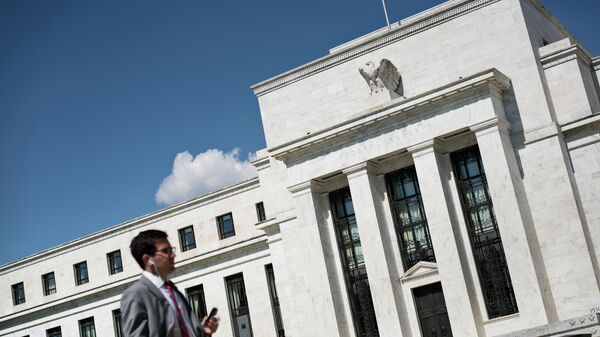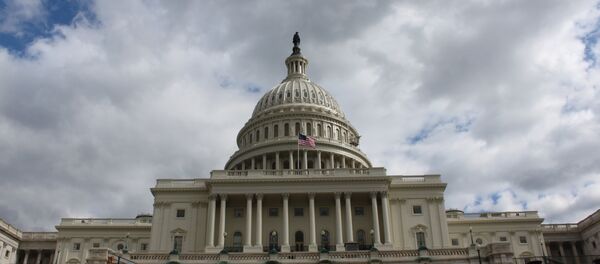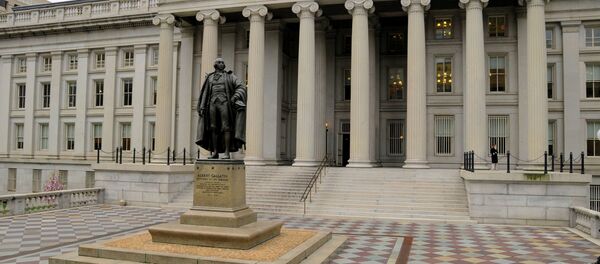Extended periods of market volatility oftentimes precede recessions in broader economies, and the current situation might be the case: with private sector capital investment in real economy assets, like property, mining or manufacturing, shrinking steadily in the US, there is now a clear prospect of across-the-board disinvestment in many sectors of the economy, paving the way to a recession.
The Obama administration, however, has been attempting for several years to make up for these losses by increasing the scale of government investment, yet, the 2.2% growth in 2015 was a disappointment. Mismanagement in government funds allocation and private investment being diverted to Wall Street have created a hazardous pattern, which other advanced economies might follow, nosediving into recessions of their own. Emerging markets, at least those not in a recession yet, are set to follow next.
"When global growth is so sluggish, when corporate profits are so miserable, when pay rises are so small — you don't need a very big shock to disturb global markets significantly," Eric Chaney of Axa Investment Managers, the French insurance enterprise said.
The consensus estimate of global economic expansion outlook (based off the IMF figures) was lowered to 2.7% from 3.1% early this year, which is still just above the 2-2.5% threshold, observed as dangerously low as bearing risks of recessions brewing within the midst of select advanced economies.
Exchange-traded funds (ETFs) are currently increasing their positions on US Treasuries, seeing the government as the only reliable source of economic expansion in the current environment. According to Bloomberg data, the iShares 20+ Year Treasury ETF (buying into longer-term US bonds), has attracted some $2.8 billion (about 30% the fund's total capitalization) of investment money since the start of 2016. Overall, Treasuries ETFs have drawn some $12 trillion in the first month-and-a-half of this year.
US small caps, most prominently, in energy and tech sectors have been expanding their scope of operation steadily since at least 2011, and when corporate America faced shrinking earnings as an aftereffect of Fed tightening, small caps flourished (not any longer those in energy, however). Most small caps issue high-yielding, or junk, bonds, and after December's Third Avenue crash decimated their worth and tamed appetites for junk somewhat, certain market participants see a buying opportunity.
Wall Street volatility has for a while been "making people nervous, but that's a buying opportunity," Gershon Distenfeld of AllianceBernstein Holding LP said.
"Everything is oversold because of the fear of energy. Lower oil prices are very bad for the energy companies, but they are not necessarily bad for the rest of the market."
So far, it is unclear which trend prevails in further economic development in the US, whether it would be small caps saving the day, or a clumsy cuttlefish of government mismanagement weighing on the already weakening economy.
Yet, the next recession might as well start as a consequence of the Chinese risks, or Brexit (the UK parting ways with the EU), as in such a case, the City of London might be losing some of its financial power.
"London is the number one financial center, for example. If there was any destabilization of the financial industry in the UK, it would transmit quickly around world markets," Eric Chaney of Axa said. "London is systemic."
According to Bank of America Merrill Lynch estimates, there is a 20% risk of a recession in the US this year. Other financial institutions, including Societe Generale and Morgan Stanley, also place a 20% chance of a global recession happening in 2016. Advanced economies balancing on the verge of disinflation, and mainland China facing a slump in its foreign trade (imports down 11%, exports slid 18% in January), might be nearing a global overproduction crisis as well. However, according to JP Morgan, the international economy faced factory-gate disinflation at least 12 times since 1970, with a recession following it only in 50% of all cases.
Meanwhile, policymakers across the globe have little to offer countering the abundance of risks. Negative interest rates in the Eurozone and Japan have so far had only a negligible effect spurring inflation and the overall growth. The US monetary tightening, albeit set to continue at a slower pace, means that the prospects of global growth would largely depend on how the US economy fares in 2016, as international markets have their eyes set on the dollar's FX rate at its implications to international trade.





